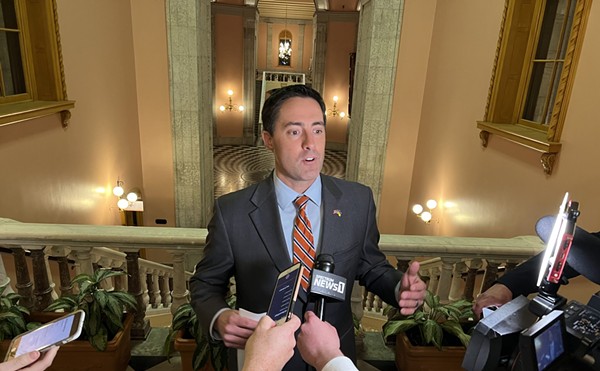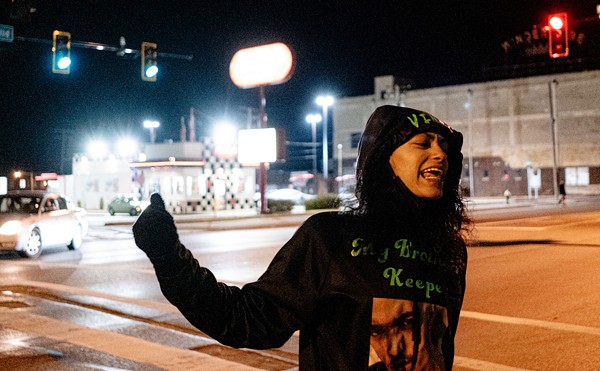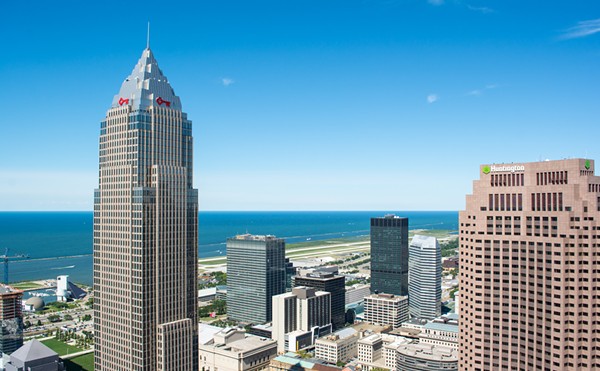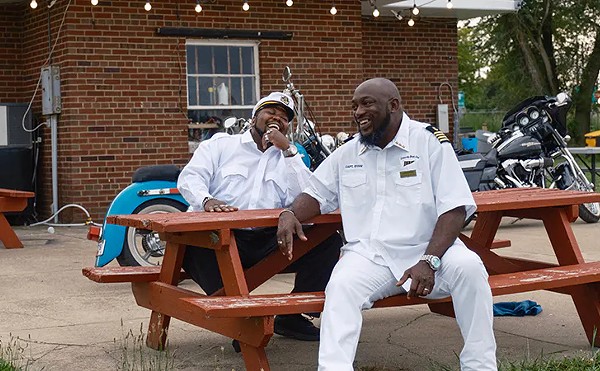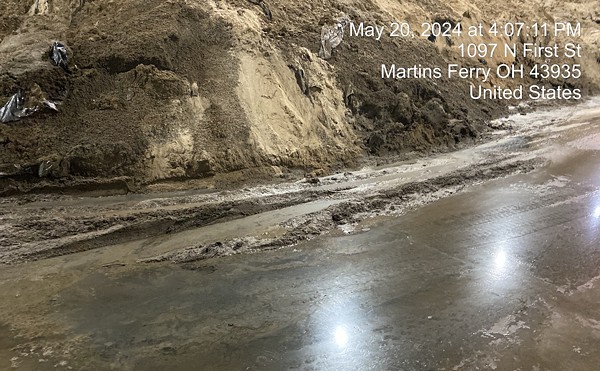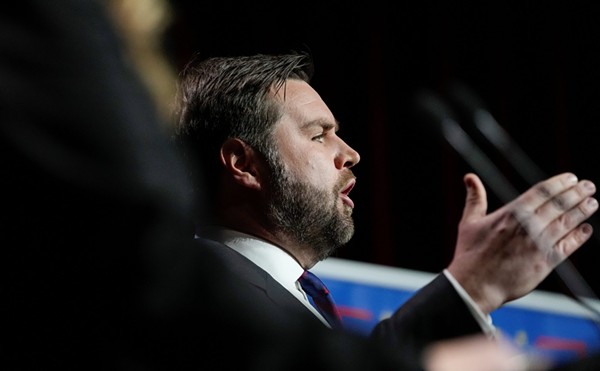It was here that Urbin ruled this city for eight years, from his heady beginnings in 1992 to the last days of 2000, when he sat with the blinds drawn, whispering from behind his mahogany desk, convinced the place was bugged.
This turreted office witnessed the ultimate rags-to-riches tale: Urbin arrived as an unskilled worker who barely graduated high school; here, he became a powerful politician who partied with hip-hop star Lisa "Left Eye" Lopes and crushed opponents in three straight elections. Here, too, he instructed a secretary to "bag" evidence and then dashed upstairs with a computer disk he didn't want police to see. They saw, and he is now banished from the position he loved.
Urbin came to this office with wonder at his great luck. He left with a jail sentence. In some ways, it all happened too fast. Vince Urbin achieved the only thing he wanted by age 34. Now, he has four felony convictions on his record and a second trial beginning this month; his political career is over and his money gone. He is 42.
Avon Lake is tucked into the northeastern corner of Lorain County, 12 square miles of trim 1950s ranches, five-bedroom yuppie colonials, and aging factories. When the Urbin clan moved west from Lakewood in 1965, Vince Urbin was seven years old. The city was five. With a population of 10,000, Avon Lake was a close-knit place. The yuppies were nowhere in sight.
As Urbin grew to manhood and Avon Lake's population nearly doubled, the city kept its small-town roots. Cleveland may be 18 miles east, but Lorain, with its long history of petty corruption, is only 10 miles west. Beneath Avon Lake's bucolic charm lies that dirty undertow -- a culture that thrives on backroom deals and friendships, a City Hall that has seen its share of scandal. A total of nine city officials have faced criminal charges in the last 12 years: two mayors, two city engineers, three councilmen, a finance director, and a police chief. The finance director was the only one not found guilty.
Like the city that grew up with him, young Vince Urbin was ambitious. The seventh of eight children, he strove to stand out. Jim Smith, now the mayor of neighboring Avon and then a barber, cut his hair. "He was a likable kid," Smith says. "Everybody loved him. He was a born politician."
"He could get other kids to follow him," says Bea Beard, who owned Chuck's Food Fair a block from Urbin's boyhood home. "He was a pied piper, if you know what I mean. He could talk them into doing anything . . . He was a kid you wanted to watch."
Classmates at Avon Lake High recall a skinny young man who worked hard for his 1.3 grade-point average. They also remember a series of successful elections. Urbin was a three-year student council member, president of the choir, and senior class president. Gregory Zilka, Urbin's high school government teacher, remembers a teenager so anxious to win the class presidency that he wouldn't even wear blue jeans, even though they were permitted by school officials. "He wanted to make sure he wasn't guilty of any infraction or whatever," Zilka says. "That's how much he was focused."
But unlike other high school politicians, who dream of being a senator or even president, Vince Urbin's sights were limited to the world he knew. "He always wanted to be mayor of Avon Lake," Zilka says. "Always."
A marginal student, Urbin didn't go to college. He applied to be a police officer, but he failed the city's civil service exam. So he married his high school sweetheart, fathered a daughter, and ran for city council. At 24, he was the youngest councilman in Avon Lake history.
After 10 years, fate intervened. The city's long-serving mayor, Richard Hausrod, was sent to prison for stealing from his own charity. Urbin, handpicked by Hausrod to be council president months earlier, was sworn in as mayor and pledged to restore trust in public officials. He was a month shy of his 34th birthday.
"Anyone who knows me knows I've always dreamed of becoming mayor," he told one newspaper, as he posed with his wife and two grinning children. "But I never dreamed of backing into the position like this."
Hausrod was a close friend of Urbin's late father, Robert, the city's gregarious parks superintendent. Hausrod told a teenage Vince Urbin that he would someday be mayor, and as council president, Urbin repaid that benevolence with loyalty. He remained one of Hausrod's most vocal defenders, even as scandal erupted. When Councilman Karl "K.C." Zuber charged that Hausrod engineered the removal of political enemies from the planning commission, Urbin asked the law director to investigate Zuber. Even after a grand jury indicted Hausrod for stealing from his Christmas Basket charity, Urbin stood firm, blasting the reporter who broke the story for his negativity.
Yet after months of accusing investigators of a vendetta against him, Hausrod signed a confession in October 1992 to halt further prosecution. In it, he acknowledged stealing at least $6,500. The scheme was simple: Collect monetary donations for the poor, pocket the cash, and then demand free food from local merchants, donating that to the needy instead. Hausrod pleaded guilty to theft, theft in office, tampering with evidence, and two misdemeanors for not registering with the Ohio attorney general. He also admitted to extorting everything from a tree fort to new flooring from local developers.
The confession rocked Avon Lake. Urbin called it a nightmare. Even city officials who didn't necessarily like Hausrod were shocked by his admission of guilt.
"It was like 'Oh my gosh, I don't believe this,'" says Dale Cracas, a former councilman. "We looked at Vince Urbin as a person who was going to move us past that incident. And that's why it's so unfortunate what's happened now."
Although Urbin was clearly thrilled to become mayor, city workers say his confident image masked fear. His work experience -- shift supervisor at a gas station, laboratory technician, and newspaper distribution manager -- bore little relation to what he suddenly had to do. "He was paranoid in the beginning," says a former city employee. "He was afraid if he made a mistake, it would just crumble everything."
The new mayor faced handicaps beyond inexperience. Urbin went to his new lakefront office to look for Hausrod's "economic development" file and found nothing. With the city's institutional knowledge locked away in prison, he found himself starting from scratch. Even worse, the finance director reported that an accounting error had set Avon Lake on course to finish the year $200,000 in debt.
Yet Urbin rose to the challenge. Voters approved an income tax increase that November, alleviating financial strain. Announcing a run for reelection one year later, Urbin described City Hall as "a smooth-running, hard-working machine." Voters evidently agreed, choosing him over his only challenger, Zuber, by a three-to-one margin.
The liabilities that would sink Vince Urbin remained hidden in his first year as mayor. But after his easy win, Urbin was already flirting with his own worst instincts: a thin skin that turned critics into enemies, a carelessness with the law, and an arrogance that transformed a small-town mayor's office into a castle. Avon Lake, with its history of blind trust in public officials, did nothing to hold him in check.
Zuber remembers his horror when Urbin announced that he would host a "Mayor's Ball" in early 1995 to raise money for the city and schools. It had been two years since Hausrod was convicted of stealing from his charity.
"We were shocked," Zuber says. "Why he would even want to mess with that, after the last mayor went to jail for it . . . I was just dumbfounded."
Perhaps even more surprising was that Urbin failed to register the charity with Ohio's secretary of state until 1997 and its attorney general until two years after that. The law requires both registrations, and Hausrod had pleaded guilty to forgoing the latter. By the time Urbin finally completed the paperwork, the Mayor's Ball was five years old and had generated nearly $100,000, according to its own records.
The structure of the ball only fed Zuber's fears. There were two components: an annual dinner dance and a "red bucket" drive, with collection spots around town. About 50 percent of profits paid for the cost of the ball. The remainder covered a holiday fireworks show and a host of smaller contributions. The Mayor's Ball doled out money to everyone from the high school student council to the American Cancer Society.
In theory, there were three trustees, but Urbin had near-total control. He alone counted the bucket money. He decided where donations went. He was the only person who ever signed a Mayor's Ball check, despite a state law requiring two signatures. The ball's ledger, finally surrendered to investigators almost a year after their request, shows only Urbin's handwriting. Numbers are crossed out, checks voided, and descriptions often vague. Several times, the ledger refers to expenses only as "cash." Prosecutors never found a ledger or bank account for the bucket money.
Zilka, a longtime councilman, believes Urbin began the Mayor's Ball with good intentions. But Zilka also remembers his surprise at learning that the mayor controlled the charity's cash flow without any oversight.
"I was stunned by that," he says. "I thought, this has some potential for some charges that could become embarrassing, even though everything is done with good intentions."
Urbin probably also meant well when he maneuvered to replace three argumentative council members in 1995. They had suggested term limits for the mayor's post. They wanted the council president, not Urbin, to preside over their meetings. So Urbin slyly recruited and endorsed three alternative candidates that fall election. All three won and proceeded to elect as council president Ronald Andolsen, a close Urbin supporter.
Council was never the same. Neither was Urbin. He had become a star, both in Avon Lake and Lorain County. He partied with Browns wide receiver Andre Rison and TLC's "Left Eye" Lopes at their Avon Lake mansion. Businessmen brandished blank checks, begging him to run for county commissioner. A column in the Elyria Chronicle-Telegram compared Urbin to Michael J. Fox and his wife to Helen Hunt. The couple bought a $165,000 house -- twice the price of their previous home and 35 years newer.
It may have been too much to handle. Acquaintances say Urbin became grander and grander. A former newspaper editor remembers seeing him at the Jacobs Field Terrace Club, boasting that he was "only 38 years old and already the mayor." The pretty teenage waitress was not impressed.
"After the election, it was like he was coronated," one city worker says.
"He was a mayor who thought he was president," another says. "He forgot who he worked for. In the last five to six years, all that consumed him was ego."
Staffers privately mocked the way Urbin jingled his keys, waiting for the parks superintendent -- a position his late father had held -- to ready his car. Often he called city employees around 10:15 or 10:30 a.m. to say he was in a meeting in Elyria and running late -- a source of great derision, a staffer recalls. "He picked out the phones we had," the staffer says. "You'd think he knew we had caller ID and could tell he was calling from home!"
Officials from other cities say Urbin became difficult to deal with. "He didn't know how to be nice to people," says one. Another notes his hypocrisy. Though he often opposed liquor licenses for new businesses, he served alcohol at the Mayor's Ball and campaign functions. And while he contributed to groups working to cut teen smoking, his own habit was something of an open secret. "Anytime we'd take a break, he'd slip away and come back smelling like smoke," the official says. "Did he really think we didn't notice?"
Urbin did not respond to repeated requests for an interview.
Avon Lake became Urbin's kingdom. His lakefront office was isolated from other employees, and with its turrets and private corridors, the second floor was perfectly designed for secrecy. A locked room, dubbed "Fort Knox" by staffers, held Urbin's laptop, fax machine, and assorted records. He was the only person with a key.
When someone suggested the mayor should move to City Hall, Urbin fired back by saying that he needed privacy to meet important businessmen and broker big deals. No one brought it up again. Workers knew better than to challenge a mayor with such support. The new council members looked to Urbin for guidance. Older members, remembering the fate of vocal colleagues, learned to hold their tongues.
"If you weren't on his team, you didn't get a promotion," says former Councilman Ed Mitchell. "You'd get bypassed by people more friendly to Vince. The council president was playing ball with him, so he could get away with it."
Total cooperation was key. John Wozniak, one of Urbin's 1995 council recruits, once publicly announced a controversial committee vote. Later that night, he received a "screaming" phone call from Council President Andolsen. "He thrashed me for that," Wozniak says. "When you went to vote on the council floor, it was understood that everyone would vote 'aye' to show unity, even if the vote was different in the committee meeting."
For a while, it worked. Urbin shepherded a number of projects: a new complex for the police and municipal court. A park with Bay Village. An industrial parkway. His speeches, a mix of hometown pride, piety, and Bartlett's Familiar Quotations, boasted of a government that got things done. He took time to schmooze every soccer mom and kiss every baby. He could not have been more popular.
Then in December 1999, one month after crushing another mayoral challenger, Urbin made what appeared to be a trivial mistake. The occasion was the culmination of his hard work: the ceremonial ribbon-cutting for Pin Oak Parkway, Avon Lake's mile-long bid for economic development.
At the time, the mistake seemed so small that even Urbin's enemies missed it. If it hadn't been for an annoyed library worker, no one might ever have noticed that Vince Urbin, the proud mayor of Avon Lake, had just committed a felony.
But the discovery set off a reaction that would ruin Urbin's career. Paranoid and suspicious, Urbin reacted poorly to the glare of an investigation. Over seven months, he would be indicted on 11 counts -- 5 stemming from his actions after he became aware of a police investigation.
The house of cards Urbin had built so carefully would collapse under the stress. Unable to comprehend how the police got their information, Urbin became convinced that his office was bugged. He never stopped to think that people close to him were tired of his arrogance -- and were singing to the authorities.
None of that seemed likely or even probable in December 1999, when a patrolman entered the tiny office Sergeant Jack Hall shared with two other detectives and gave him a phone message. The caller, identified only as an employee of the library, wanted to know if it was legal for Urbin to use his brother's catering business for city events. The post-ribbon-cutting celebration, held at the library, had been catered by the Fountain Bleau, which the caller believed Dan Urbin owned.
The patrolman gave Hall the message, along with a photocopy of the state's conflict-of-interest law, which bars public officials from awarding government contracts to immediate family members. Doing so is a fifth-degree felony.
Hall didn't think much of it. Lorain County is home to hundreds of minor scandals, many of which resolve neatly. A few days passed, Hall says, before he thought to mention it to Police Chief David Owad, who recommended Hall look into it and report back.
At that point, Hall had been with the department five years and had just been promoted to the detective bureau one month before.
"I was almost like 'What's the big deal?'" Hall remembers. "We weren't even looking at it criminally at that point." That did not change, Hall says, after the city used Fountain Bleau one week later for another function: Urbin's swearing-in ceremony on January 1.
Shortly after Christmas, Hall requested Fountain Bleau invoices and checks from the city's finance director, Susan Valasco. The records were slow in coming, Hall says, and then incomplete. Valasco had to be subpoenaed twice. "That was the first point that we felt there might be something more to this," Hall says.
Valasco, who has left Avon Lake and no longer has a listed telephone number, did not respond to a written request for comment.
Sometime before April, the case grew to include the Mayor's Ball and Urbin's campaign records -- and Hall's requests for paperwork were no more successful. Court testimony regarding three days in early April 2000 makes that clear. Before then, prosecutors were suspicious, but not alarmed. By the third day, Hall's report had become an investigation, and Lorain County Prosecutor Gregory White had publicly confirmed his involvement.
On April 5, Urbin learned that Hall was coming to his office to retrieve records. According to testimony, Urbin instructed his secretary to "bag" evidence. The secretary refused and called police. Urbin snatched a computer disk from her desk. When Hall arrived and demanded the disk, Urbin said he didn't have it. Hall raised his voice. Urbin handed over the disk, which contained names of people wanting yard signs for the 1999 election. Prosecutors never charged Urbin for the disk's contents, but the judge would later scold him for using public property and public employees for his campaign. Hall, focused on the Mayor's Ball, took Urbin's laptop and some records.
The next day, Urbin boxed up more Mayor's Ball records and took them home. A photographer for The Morning Journal in Lorain snapped a photo of him loading the documents into his Ford Taurus. On April 7, when Hall asked Valasco for those documents, she lied and said they were at her home. Then she admitted she had given them to the mayor.
"As I asked her why she turned the records over to the mayor, she was afraid that, if the mayor was sent to prison or jail, someone could come in and clean house, and she could lose her job," Hall testified.
Urbin eventually surrendered most of the records that day. But the damage had already been done, White says. Those three days of frantic behavior would result in two felony charges against Urbin and two against Valasco. They also determined the future of the investigation.
"Had he just done some business with his brother contrary to the state ethics law, we would have done what we've done in other instances: suggested he pay the money back and told him not to do it again," White says. "But we had other circumstances here, with obstruction of justice and attempts to cover things up, that put this case on a whole new level."
Those April days changed everything for Hall, too.
"Knowing what had happened in his secretary's office, for him to look me in the eye and tell me, 'I don't know what you're talking about,' that changed the course for me," Hall says. "That was the minute things changed."
Hall wasn't the only one who began to see Urbin differently that spring. Up to that point, Sheffield Village Mayor Darlene Ondercin had been a friend. A fellow graduate of Avon Lake High and an ally in county politics, she hoped that the much-publicized investigation would lead to nothing.
Then, a few weeks after his run-in with Hall, Urbin called Ondercin at home, leaving three messages within a few hours. She agreed to meet him at her office the next morning.
After brief small talk, Urbin questioned Ondercin about Hall's employment at the Sheffield Village police department five years before. Hall had been involved with "something," Urbin said, and he had been advised to get the information from her. Then he cautioned her. "If anyone knows about this, we could both go to jail," she remembers him saying.
Ondercin, who had no idea what Urbin was talking about, asked if he wanted to make a public-records request for Hall's personnel file. "He said no, and it was obvious he didn't want to go on the record," Ondercin says. "And at that point, I saw Vince differently."
After Urbin left, Ondercin called a village police detective and reported the conversation. The detective called Hall with the story later that day.
Ondercin was not asked to testify about that day. But she did testify for the prosecution in State of Ohio v. Vince Urbin, recalling an April 8 conversation in which Urbin said that the boxes in his Taurus pictured in that day's newspaper were, indeed, Mayor's Ball records.
Ondercin was the only elected official in the county to testify against Urbin. She says she has nothing against him; it was her duty to tell the truth.
"I had him set up in my mind as a great mayor," Ondercin says. "At that point, I realized he was human. I was immensely disappointed, and later, I was angry that he tried to draw me in. For him to say, 'We can go to jail for this . . .' I thought, what are you doing to me?
"I just did what I had to do. I just felt angry."
Urbin was indicted on July 25, 2000. The charges against him: theft, theft in office, election falsification, complicity to tampering with evidence, soliciting improper compensation, and three counts each of tampering with evidence and unlawful interest in a public contract. The two theft charges involved $2,667.08 in Mayor's Ball checks that Urbin had written to cash, himself, or his wife.
Valasco and Urbin's brother were also charged: Valasco for tampering with evidence and obstructing justice, Dan Urbin for unlawful interest in a public contract and liquor law violations at the Fountain Bleau and his second business, the Tom-Car convenience store on State Route 83. Dan Urbin, prosecutors alleged, was manager of the Fountain Bleau and was negotiating to buy it when Vince Urbin paid the company $3,587 to cater three city functions.
All three defendants pleaded not guilty. Mindful of White's strong record of convicting public officials, a friend counseled the mayor to plea-bargain. Urbin would hear none of it, the friend recalls. "I'm going to make it look like the O.J. Simpson trial," he remembers Urbin saying.
Valasco resigned from her job with the city, but Urbin continued to serve. In November, he had a mild heart attack. He returned to the job a week later. City council, already accustomed to tiptoeing around the mayor's legal problems, grew even more cautious. Adding to the discomfort was Urbin's unwillingness to address the charges publicly. Council was supposed to conduct business as usual.
"Here was a man you knew for five and a half years, and you were searching how to approach him," Wozniak says. "He had this hollow look. You wondered what was going on with him. You didn't want to believe anything, but you didn't know."
In January, the mayor of Avon Lake went to trial.
It was a laborious affair. Urbin and Valasco were tried together, and testimony was technical. Hall, accused of having a vendetta against the mayor, was on the stand for 10 1/2 hours, badgered over everything from police union negotiations to his journalism degree. Three city employees also took the stand for the prosecution, including Urbin's secretary and the parks superintendent.
Prosecutors entered as evidence a memo from 1997 that Urbin sent all city employees, asking them to read an attached photocopy. The attachment outlined the law forbidding officials to do public business with a family member. When Urbin took the stand, he admitted he was aware of the law, but argued that it did not apply until Dan Urbin took ownership of the catering hall.
After six days of testimony, the jury deliberated for three days before returning verdicts. Valasco was cleared of all charges. Urbin was found guilty of tampering with evidence, complicity to tampering with evidence, and two counts of unlawful interest in a public contract. The other seven charges earned not guilty verdicts. But it didn't matter. The four convictions are all felonies, which bars Urbin from ever holding elected office in Ohio.
Urbin clung to office for two months after the jury's verdict. The assistant law director determined that a conviction wasn't official until sentencing, so Urbin continued to draw his $65,000 salary. Council, unwilling to force him out, waited tensely for his resignation.
It finally came March 7, at a press conference in which Urbin outlined his accomplishments. The speech, delivered with his wife at his side, was classic Urbin: dramatic, carefully rehearsed, and slightly pompous. He spoke of his sacrifices and his love for Avon Lake. He urged council to pass his 2001 budget.
"We are an all-around closer community than we ever have been," he said. "There's a newfound trust between establishments around town. Those things don't just happen.
"I never would have been able to carry the torch for so many of the projects I've already mentioned -- or been able to attack the issues that you wanted me to address -- without your unwavering support. There is no doubt in my mind that, with all the trials and tribulations I've endured as mayor, it was you, the people of Avon Lake, who have always, by large majorities, been very supportive of me and given me the confidence to see it through."
He apologized for possible failures, but never acknowledged wrongdoing. "I'm reminded of a famous quote by a member of the Lincoln Administration," he said. "Allow me to paraphrase, if you will. 'I did the very, the very best I could -- and the very best that I know how, and I continue to do that until this time and this day.'" A Cleveland radio station had a field day the next morning, playing snippets of the oration, its announcers snickering.
But the next day brought news worse than mockery. Unknown to Urbin, the grand jury had indicted him again the day before -- this time on two felony charges of bribery.
Vince Urbin's second trial begins June 25. This time, he faces Mary Cacioppo, a stern judge known for her low tolerance of public misconduct. Even worse, the prosecution's key witness is Herman "Bucky" Kopf, arguably the heaviest hitter in Avon Lake.
Kopf started a small home-building company in Avon Lake the same year the Urbins moved to town; by 2000, Standard and Poor counted 100 employees and $5.6 million in annual sales. Kopf thrived in Avon Lake, often outmuscling competitors through his close friendships with City Hall and distinct brand of chutzpah. He built Avon Lake's most prestigious developments, its biggest shopping center, and its retirement complex. He owns one of its golf courses, its winery, and two restaurants. Despite constant speculation that he owned City Hall as well, Kopf prospered. A generous contributor to both County Prosecutor White and Urbin's annual golf outings, he seemed untouchable.
That ended in May, when the builder entered a courtroom packed with abusive husbands and small-time drug dealers, and pleaded guilty to a felony charge of obstructing justice. At the hearing, Kopf indicated that he will testify for the prosecution in State of Ohio v. Vince Urbin, part two.
Kopf came to the prosecutor's attention after the builder slipped Urbin an envelope with $2,000 cash for his defense fund last December. The gift violates Ohio's ethics law, which prohibits officials from accepting anything of value from someone who might benefit from their actions. Urbin stealthily returned it after prosecutors began to subpoena defense-fund members in January.
In his January grand jury testimony, Kopf called the donation a "one-time compassionate act." Subsequent voice stress tests seemed to indicate he was lying. After Kopf bared his soul to police investigators, he passed the tests. Kopf then testified again before the grand jury, resulting in his own plea and the bribery charges against Urbin.
Court documents suggest that Kopf's testimony may shatter political careers in Avon Lake beyond that of Vince Urbin. His interviews with police detectives portray broad-based, petty graft festering below Avon Lake's placid surface: cash donations of $200 to $500 for Urbin and Council President Andolsen. A job at his golf course for the son of Councilman Jim Simonovich, a planning commission member and Urbin ally. A "routine practice" of gifting local politicians, like Utilities Director John Kniepper, with turkeys and boxes of golf balls. Cash donations to Urbin's Mayor's Ball and golf outings. Up to 70 bottles of wine donated at Urbin's request for a regional group visiting Avon Lake.
Kopf did not return calls for comment.
Despite Kopf's damning testimony, Urbin has said he is not guilty and shows no indication that he will cut a deal. He has also appealed the initial convictions. The court has yet to rule on whether it will take the case.
The legal battle continues, and bills continue to mount. Urbin and his wife had nearly $25,000 in credit card debt and two mortgages, even before the investigation began; a daughter started college at a private school last August. Since the subpoenas, the legal defense fund has been quiet, and Urbin reported not a single donation on his financial disclosure form for the year 2000. The family had to sell its second house, a rental property, this month.
"This has been a hard year for us," Urbin's wife wrote Judge Richard Markus before his sentencing. "With all due respect, Judge, with my income alone, I cannot even afford to make our current house payment. Sending Vince to prison would spell total financial ruin for our family."
Markus sentenced Urbin to 90 days in the county jail, a $1,000 fine, and court costs, which totaled $4,900. "There is conduct that is offensive here," Markus said, chiding Urbin for using a public facility and city employees for his election campaign. "It's a form of theft. I have to send that message somehow."
Perhaps the saddest part of Vince Urbin's fall is how many times he could have prevented it -- even before those desperate days in April 2000. According to court documents, Kopf told police that he called Urbin after reading about the Fountain Bleau expenses in the newspaper. Kopf urged the mayor to call White, tell him what happened, and "nip this thing in the bud."
But Urbin waited, Kopf said. Maybe he thought it was no big deal. Maybe he thought White would never prosecute him for something so small as a few catering jobs. Maybe he assumed that he was too popular to challenge.
And, Kopf said, by the time Urbin finally called White, it was too late. White told him to get an attorney.
Even before Kopf's testimony became public, Andolsen resigned from the council presidency and his job as acting mayor. Zilka then served as both president and mayor until the special election last month. The veteran councilman used his post to change parts of the job that Urbin loved best: He lowered the mayor's lofty seat in council chambers and moved his office to City Hall.
The eight candidates vying to replace Urbin in May's special election expanded on those ideas. They talked of limiting the mayor's power, perhaps by hiring a city manager. All agreed that the Mayor's Ball should be changed or terminated. The one candidate who promised Urbin a city job if elected finished dead last.
City officials responded to the new tone. With Zilka as president, council discusses the issues, members say. The planning commission also changed. "Some members seemed to be waiting for direction from Vince," says one longtime member. "They'd wait to see what way he would vote before making their decision. Now they speak more freely." A charter review group is considering two amendments: removing the mayor from the planning commission and taking away his ability to preside over council meetings.
Avon Lake's new mayor, Rob Berner, refused to discuss Urbin in a recent interview, saying he prefers to talk about the city and his plans to move it forward. Some of those plans, however, sharply contrast with Urbin's legacy.
Berner announced that he doesn't want to be known as "mayor," a big change from the man who used to sign his personal correspondence "Mayor Urbin." Berner is philosophical about the change. "I already know who I am," he says. "Being called 'mayor' isn't something I need to hear every day to feel good about myself. My name is Rob."
Berner also plans to keep his office at the humble municipal building, far from the ghosts that roam the mayor's office on the lake.
"I'll be at City Hall, if I have to work in a closet," he says matter-of-factly. "That's where the people are that I need to be working with."
The lakefront office eventually may be torn down, Zilka says. At 95 years old, it is impractical to heat and impossible to keep clean. In the last 10 years, there have been two suicides in its parking lot and one murder. And, of course, its last two occupants have gone to jail.
Vince Urbin may well be the last man to look out the second-floor windows and marvel at his power. Avon Lake is moving on.



